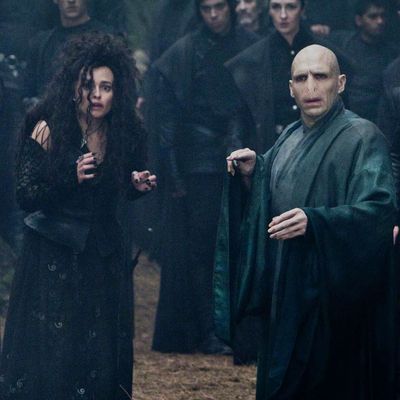
Spoilers ahead for Harry Potter and the Cursed Child.
The script for Harry Potter and the Cursed Child hit shelves Sunday and is already one of the fastest-selling books in history. The numbers indicate that Potter still has an incredible hold on the world, good news for the upcoming Fantastic Beasts and Where to Find Them film and its just-announced sequel.
But the fervor doesn’t come with the most glowing word of mouth. Though the two-part Cursed Child play, currently onstage in London, has racked up mostly positive reviews, long-time Potter fans have some contentions with the story. Some are calling the plot “bad fanfiction,” criticizing the liberal use of time travel as a way to cheaply revisit past events like the Triwizard Tournament and beloved, dead characters like Cedric Diggory and Severus Snape.
Most controversial of all is Delphini, a silver-haired, tattooed character who’s totally new to the series. Delphini begins as an ally to Albus Potter and Scorpius Malfoy (sons of Harry and Draco), posing as a cousin of Cedric’s who wants to use a recovered Time Turner to go back and save him from death. But it’s revealed in part two that she’s actually the love child of Lord Voldemort and his devoted follower, Bellatrix Lestrange, and wants the Time Turner to alter history so that her father wins the war and evil reigns.
Voldemort was long thought to be childless, and most fans assumed this was by design — so obsessed was the Dark Lord with his own immortality that an unpredictable offspring might unravel his plotted legacy. So why on earth would he have a child with Bellatrix, an unhinged devotee with an unhealthy crush on him?
The answer is really anyone’s guess — it’s unclear if Delphini was thought up by playwright Jack Thorne, director John Tiffany, J.K. Rowling, or some amalgamation of the three. But it’s hard to imagine Rowling agreeing to such a game-changing character without creating her herself, and a look back at an important Rowling influence sheds light on what might be the real inspiration for Delphini Riddle.
Voldemort and his Death Eaters are, in many ways, an allegory for Adolf Hitler’s Third Reich: A hotheaded megalomaniac tyrant obsessed with “pure blood” amasses an army of hateful followers and wreaks havoc on the world that rejected him. Voldemort is, like Hitler, childless, tyrannical, hell-bent on ridding the world of what he deems to be a lesser race, despite sharing blood with said race (Voldemort’s father was a Muggle, Hitler’s father was possibly Jewish). Both were also alluring inspirational figures for many; Hitler was powerful and popular, and attracted many women. One of them was Unity Mitford, a British socialite who pledged herself to fascism after attending a Nuremberg Rally in the early 1930s. Mitford was obsessed with Hitler, who returned her affections, believing her sent to him by fate (her grandfather was a friend of Richard Wagner*, one of Hitler’s heroes). She quickly joined the Führer’s inner circle and was frequently seen by his side at public events. The two were rumored to be romantically involved, and some accounts say that she even had his baby in secret. In fact, a 2007 Channel 4 documentary called Hitler’s British Girl investigates the possibility that Hitler’s heir is now alive and well somewhere in Britain.
Most historians argue that these rumors are merely that. But did a potential Hitler love child inspire Rowling?
It’s possible! Rowling is a massive fan of Jessica Mitford, Unity’s rebellious sister, who rejected her family’s wealth and fascism and ran away from home to fight in the Spanish Civil War. “My most influential writer, without a doubt, is Jessica Mitford,” said Rowling in a 2002 interview with The Scotsman. She cites Mitford’s autobiography, Hons and Rebels, as a formative influence and even named her eldest daughter Jessica after the author and activist.
The Mitford sisters are rumored to have inspired the Black sisters in the Harry Potter series — Bellatrix Lestrange as Unity, Narcissa Malfoy as Diana (another, though far less fanatical, Hitler supporter), and Andromeda Tonks as Jessica — women from the same home on dangerously separate paths, and important figures to their respective warring divides.
Unity’s story is a tragic one, much like Bellatrix’s, who was killed by Molly Weasley at the end of Harry Potter and the Deathly Hallows as she fought for Voldemort’s regime. In 1939, Hitler warned Unity that Germany and Britain would likely go to war, and in her dismay she shot herself in the head in Munich’s English Garden. She survived the suicide attempt and returned to Britain, but never fully recovered. The bullet, still lodged in her brain, became infected and killed her in 1948.
This possible link may not soften fan reception for an insert character like Delphini, whose existence sort of betrays everything that’s horrifying about the inhuman Lord Voldemort. But Rowling’s historical, mythical infatuations — from Christian themes of resurrection to Greek mythology and U.K. politics — have always deepened the complex Potter lore, and to this, it does offer another fascinating potential layer.
* An earlier version of this piece misidentified Richard Wagner as Robert Wagner.

